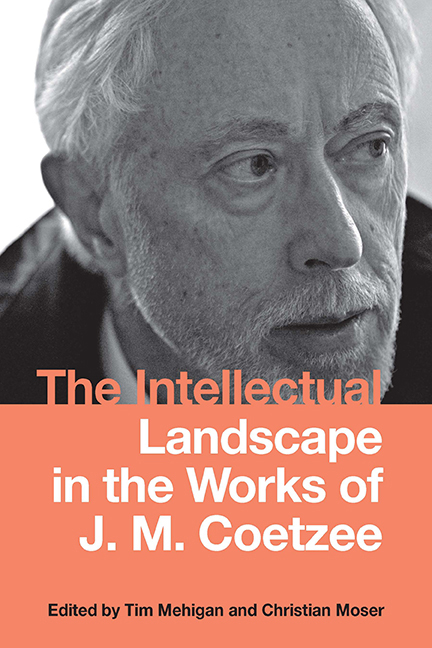Book contents
- Frontmatter
- Contents
- Acknowledgments
- Introduction: Coetzee's Intellectual Landscapes
- Part I Truth and Justification
- Part II Objectivity and Communication
- 6 Faith, Irony, Salt, and Possible Impossibilities: J. M. Coetzee's The Childhood of Jesus in Conversation with Zbigniew Herbert's “From Mythology”
- 7 Coetzee's Ethics of Language(s)
- 8 Force Fields
- 9 The Reading of Don Quixote: Literature's Migration into a New World
- 10 The Lives of Animals: From Rational Language to Speaking (of) Lions
- Part III Convergence of Interpretative Horizons and Moral Solidarity
- Notes on the Contributors
- Index
9 - The Reading of Don Quixote: Literature's Migration into a New World
from Part II - Objectivity and Communication
Published online by Cambridge University Press: 03 July 2019
- Frontmatter
- Contents
- Acknowledgments
- Introduction: Coetzee's Intellectual Landscapes
- Part I Truth and Justification
- Part II Objectivity and Communication
- 6 Faith, Irony, Salt, and Possible Impossibilities: J. M. Coetzee's The Childhood of Jesus in Conversation with Zbigniew Herbert's “From Mythology”
- 7 Coetzee's Ethics of Language(s)
- 8 Force Fields
- 9 The Reading of Don Quixote: Literature's Migration into a New World
- 10 The Lives of Animals: From Rational Language to Speaking (of) Lions
- Part III Convergence of Interpretative Horizons and Moral Solidarity
- Notes on the Contributors
- Index
Summary
J. M. COETZEE's The Childhood of Jesus, which many literary critics have seen as an allegorical, even an inscrutable novel, takes up three dimensions of otherness. First, and most obviously, it addresses the question of cultural otherness resulting from the experience of migration and from arrival in a new land. Secondly, it explores the cognitive otherness inherent in the relationship between children and adults: children may have to catch up with adults and adapt to the prevailing order, but they also have a right to their own world view. But with its depiction of intercultural and pedagogical conflicts, the plot of the novel also focuses on a third kind of otherness: the otherness of writing, its names, concepts, and fictions. This aesthetic otherness, which can only be experienced in the mode of reading, will be at the center of my discussion here; it provides the basis for the covert main character of The Childhood of Jesus.
Writing is a world of signs with a mysterious connection to spoken language. This is the field of operation of a cultural technology that makes both the otherness between languages and the otherness between adults and children into dramatic sources of difference. As can be seen in the Latin concept of infans, which stigmatized the child as a “non-speaking” creature, the decisive criterion for the otherness of childhood was once the issue of speaking, but now it is the ability to read. In the modern era, social and cultural practices of exclusion are increasingly based on the subjective distinction between the ability and the inability to read, as well as the distinction between readability and unreadability in the world of objects. Almost all processes of social communication and economic production are fundamentally regulated by operations of reading. At the same time, reading skills generate further varieties and forms of virtual reference to “the world” which must themselves be cognitively and culturally processed. Reading can lead readers to bizarre misunderstandings and unjustified acts. Works of history, and above all works of literature, are full of examples of failed or mistaken reading: the travel plans of Columbus were based on an incorrect map of the world, and it took centuries for the legends and the facts of geography to be definitively separated. Madame Bovary reads the wrong books—all-too-romantic love stories she vainly hopes to rediscover in reality.
- Type
- Chapter
- Information
- The Intellectual Landscape in the Works of J. M. Coetzee , pp. 189 - 210Publisher: Boydell & BrewerPrint publication year: 2018
- 1
- Cited by



